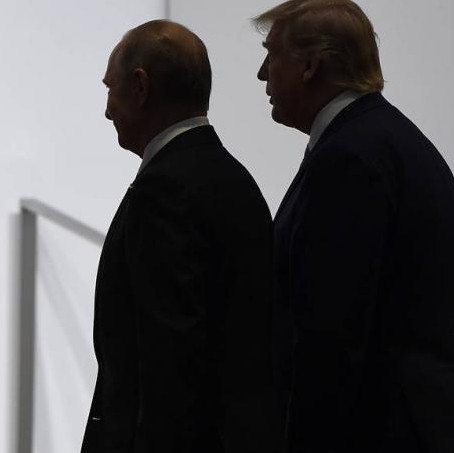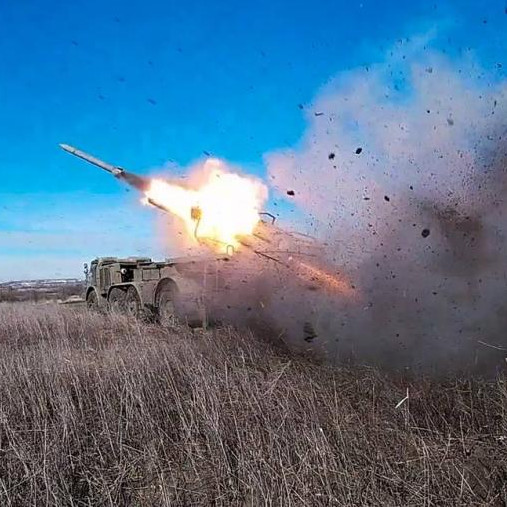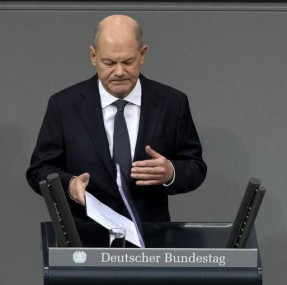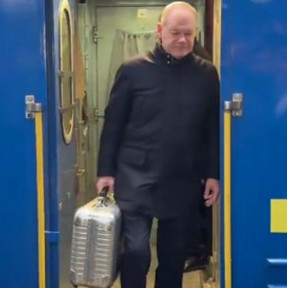“Peace is the only solution, and a political approach is the only way to achieve it,” said Saakashvili.
Here emerges an idea: somewhere it has already happened. And more than once. Recalling that already on August 7, 2008, on the eve of the Georgian aggression against South Ossetia, Saakashvili said that Georgia was not going to use force to restore its “territorial integrity”. People in South Ossetia well remember the Georgian leader’s speech because some hours later Tskhinvali was attacked by Grad type multiple-launch rocket systems.
It is also worth noting that on August 8, 2008 the Summer Olympics opening ceremony was held in Beijing, during which the world practice prohibits to initiate any armed conflicts. However, this did not prevent Georgia from launching war in South Ossetia.
During his Munich speech, the Georgian President also accused Russia of "breach of previous agreements" and “endangering the Caucasus region”. According to him, Moscow is increasing the number of troops and heavy armament in Abkhazia and South Ossetia “in response to proposals of peace by the Georgian side.”
“How does the Russian government respond to our proposals of peace?” Mikhail Saakashvili asked the conference attendees. And answered his question himself: with building up armaments. However, at the time of artillery bombardments and opening an attack by the Georgian army against Tskhinvali in South Ossetia, there were practically no Russian troops. With the exception of peacekeeping force…
The Georgian leader has clean forgotten to mention a large-scale rearmament of the Georgian army, being in full swing since 2008.
According to the US government official data contained in the Barack Obama administration’s fiscal year 2010 budget request in the foreign aid section, the volume of arms delivered from the United States to Georgia in the fiscal year 2008 was approximately $ 78.7 million.
For the year 2008 Georgia spent a major part of money on “non-automatic and semiautomatic firearms acquisition”, of which more than 256,000 units were purchased at $ 20.158 million. Georgia has spent about $16.7 million for the purchase of ammunition of more than 36 million units. Tbilisi purchased communication facilities, navigation and identification aids from the USA to the amount of more than $17 million.
Straight after the five-day war in August 2008, Mikhail Saakashvili and the then President of Ukraine Viktor Yushchenko resumed active military-technical cooperation.
This raises a question: If Georgia tries to peaceably resolve the conflict with Abkhazia and South Ossetia, what is its purpose in purchasing armaments and military equipment? Moreover, this process is going on to this day.
Commenting on the military conflict between the countries that occurred in 2008, Saakashvili emphasized that Russia’s main goals at that time were “an overthrow of democracy in Georgia” and “suspension of petroleum product supplies from the Caspian region to Europe.”
Mr. Saakashvili knows how relevant the topic of oil and gas supplies for the Europeans is. For residents of Europe, suffice it to recall natural gas delivery interruptions in winter of 2009-2010. The argument is serious but not relevant. So far as known, no gas deliveries interruptions are in view in the near future. On the contrary, Russia is successfully implementing a number of international projects in this area. Take the Southern and Nord Stream projects, for example.
Returning to the Georgian President’s speech, it is worthwhile to say that Saakashvili also accused Russia, that a few days prior to the start of hostilities, Moscow had launched a cyberwar against Tbilisi. He also said that the five-day war resulted in half a million refugees – ‘victims of ethnic cleansing’.
Thus, Georgia's president does not deny a fact of genocide of the Ossetian region by Georgian military, as is evident from numerous amateur videos posted on the Internet.
In addition, everybody remembers the famous video footage of bombardment of Tskhinvali, which were passed off by Georgian and American media as video footage of bombardment of Gori. The fact of cyberwar really happened to be. Only on the part of Georgia, and not Russia.
In his speech on the Munich floor Saakashvili also promised to increase the Georgian military contingent in Afghanistan. According to the president, it will help to establish democracy and peace in this country.
“We are ready to send an additional contingent in the coming months,” said the President of Georgia. According to him, now in Afghanistan almost a thousand of Georgian military personnel do a military service.
Not without purpose the Georgian leader touched upon this topic too. The problem of the European military participation in operations in Afghanistan has been recently especially acute.
To receive an invitation to a summit in Washington in 2010, Saakashvili had to send a battalion of Georgian troops to Afghanistan. As a result, Georgia's president achieved this. It is not improbable that this time he is pursuing similar goals.
It is no wonder that Saakashvili was sparing of expressions in his speech in Munich - Georgia's president in recent times does not often speak to the general public outside its home country. He has not been invited to major international conferences and forums; he can only attend them as an unofficial guest, his presence being just lobbyists’ credit.
From 2004, i.e. with the Rose Revolution winning up to 2010, inclusive, the US lobbying companies’ help had cost the Georgian State more than two and a half million dollars. According to the Georgian Kviris Palette (Palette of the Week), the biggest payments in 2010, which accounted for 1 million 306 thousand 800 dollars, went to three companies - The Podesta Group, The Iftaca Group and the Gephardt Group. The Podesta Group alone has received 600 thousand dollars.
However, even lobbyists can not do everything. Many European leaders are gradually distancing themselves from Saakashvili. It became especially clear after Heidi Tagliavini’s report of the outcome of an investigation by the EU international commission.
Recalling that on September 30, 2010, the international independent South Ossetia conflict fact-finding mission communicated a report on results of its work to representatives of Russia, Georgia, UN, EC and OSCE. The EU Commission concluded that it was Georgian leadership that had begun military actions against South Ossetia and been preparing a new war in Abkhazia. No other than the President of Georgia Mikhail Saakashvili ordered an attack against Tskhinvali on the night of August 7-8, 2008.
The USA was Georgia's closest ally. But it was during the administration of former President George Bush. With the democrats coming to power at the head of Barack Obama, the situation has dramatically changed. Recall at least how long it took for Mr. Saakashvili to meet with the new US President. Georgian leader was not invited to the new US President’s inauguration, but just the same he arrived and came up to Barack Obama, snatched an opportunity and shook hands with him. “Great success” of Georgian diplomacy.
President Saakashvili waited for his first official private meeting with the American president until 2010. A brief conversation between the two leaders took place during a dinner held in the framework of the UN climate summit in Copenhagen.
In January 2011, Georgian President Mikhail Saakashvili was paying a working visit to Washington. The official purpose of the visit were the events dedicated to commemoration of the famous American diplomat Richard Holbrooke. Then, the media noted that the visit could be connected with the US willingness to supply Georgia air-defense and antitank defense capabilities at tens of millions of dollars. However, the official Tbilisi denied this version in every possible way. And Mikhail Saakashvili himself said that he went not for the military but for the economic aid. As part of this trip, the president of Georgia, in particular, held a meeting with Barack Obama.
However, according to a member of the Representative Public Organisational Group, Lasha Amirejibi, the meeting did not go off swimmingly: the US president “demanded to put an end to speculation about the North Caucasus.”
“Mr. Saakashvili was especially sternly demanded to stop defiant talks about genocide of the Circassian people,” said Lasha Amirejibi.
The oppositionist noted that “it was clearly explained to Saakashvili that Americans are interested in good relations with Russian, so he should not be a provoking factor.” “Circassian genocide is not your business, Saakashvili was told straight,” the politician said.
It is simply evident that Saakashvili in the future will continue to strongly criticize the Russian leadership. However, the Georgian leader’s theses and arguments have been expressed more than once. Munich speech by the President of Georgia is a long-awaited opportunity to speak before the European community. Except that the image of the Georgian leader has not become better.









